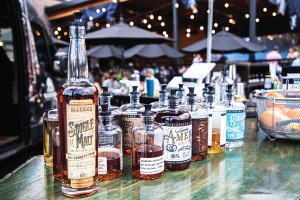Operation Maker’s Mark: The Results Are In
A couple of months ago, I reported my suspicions that Oscar’s, a popular hole-in-the-wall bar at 1524 Sansom Street, was serving cheap bourbon to customers who ordered Maker’s Mark. I filed a formal complaint with the State Police’s Bureau of Liquor Control Enforcement, whose Officer Tara Amato paid a visit to Oscar’s, confiscating six bottles of liquor. Many of the bar’s devoted patrons and one employee attacked on our comments page, accusing me of “bad journalism” and, worst of all, of being a “bourbon fraud.”
This morning, Officer Amato informed me that the state’s crime lab (yes, the same one that analyzes DNA evidence and fibers from murder scenes — probably a good indicator of why it took two months to process the seized liquor) has concluded that the Maker’s Mark she took from Oscar’s in late July is, in fact, not the genuine article. As she stated:
“Results of the analysis of item 1.1 (Maker’s Mark Whiskey) do not agree with the results of the analysis of the authentic sample (item 2.1) of Maker’s Mark Whiskey. Item 1.1 was determined to be contaminated.”
And, as a special bonus, Amato indicated that the bottle of Ketel One vodka was also not Ketel One. The remaining bottles taken from the bar that day were “determined to be true samples.” The results do not specify how the contamination occurred — did Oscar’s water down the booze? substitute rotgut for the real thing? — but clearly something is amiss. Oscar’s did not immediately return a call for comment this afternoon.
According to Amato, her office’s legal department will now determine whether to issue a citation, after which a fine, suspension, or other penalty could be imposed. Whether or not to issue a citation? Though it might come as a surprise to you, I used to be a fan of Oscar’s. Good crowd. Generally friendly staff. And 23-ounce draft beers for $3.25. But in light of these crime lab results, yeah, I think they’d better go ahead and issue that citation.


